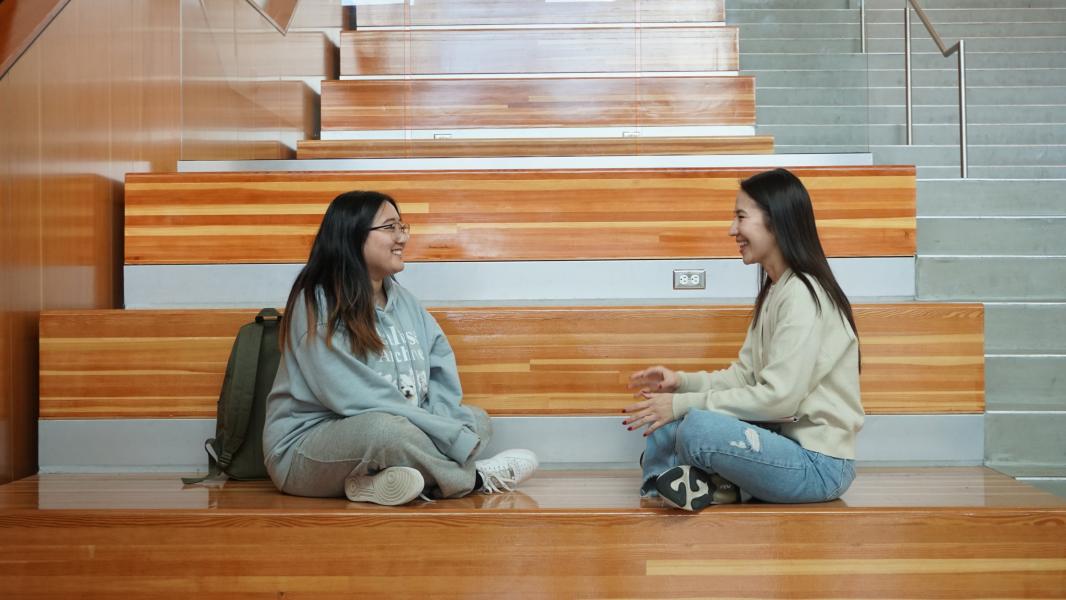
You may find yourself at times surrounded by people, but having quality connections to them is important for your sense of belonging and feeling cared for. Having someone you can reach out to, having a friend or family member to appreciate you, and contributing to the way someone else experiences value and support are important aspects of what every human deserves to feel: socially connected.
As a student, you may have great social relationships, but it can feel hard to stay connected to them especially during a busy term as other priorities take over, and you get busy with assignments, work, and other parts of life. Same goes for some of the people around you. It’s common to put social connections on pause and try to get back to them at the end of the term — if at all. But quality relationships with others are important.
Social connection has been linked to impacting healthy behaviour, improved physical and mental health outcomes, enhanced immunity and recovery from stress, illness, and disease, and increased sense of purpose and meaning in life.1-4
Making and maintaining social connections can support other areas of life, like academics, hobbies, physical well-being, mental health, and anything else that feels important. Quality relationships are important. With that in mind, here are some tips to enhance social connections as a student.
Unfamiliar situations can be opportunities for personal growth and forming new friendships. If you consider yourself with more introverted energy, or aren’t usually the one to initiate conversation, trying one of the below tips can be a great starting point as you’re more likely to meet people with shared interests:
-
Sign up for activities and extracurriculars that genuinely interest you (dance, art, gaming). SFU Rec hosts a trial week, and SFSS has a number of clubs on campus to join.
- Offer to organize a check-in or study meeting, or even a group chat with your classmates so you can connect over course assignments and lectures.
-
Join a committee or find ways to volunteer or get involved at SFU - or - find an organization in your community that interests you and volunteer doing something you enjoy (Ex: helping at an animal rescue).
If you’re living far from home and away from your closest friends, or if you don’t see your networks often because of conflicting schedules, there are still ways to intentionally connect to them. Setting up a regular routine and modelling the way you want others to make an effort will also help them to maintain connection with you too:
-
Take a few minutes and mindfully check in with a friend or family member just to say hi. Send them a message and schedule a video call to catch up.
-
When you’re working on a class discussion or project, be intentional about getting to know each other as people outside of the classroom—not just as group partners. (Ex: How many of you also work? Are any of you in clubs on campus?)
-
Add social plans to your schedule and stick to them. Want to take pics in the snow on a mountain this winter, or go to a particular concert or event? Treat it like a priority and plan time to disconnect from work and studies. Focus on spending quality time with friends and family in places that bring comfort, joy, and excitement.
Creating and maintaining relationships with others can take a lot of energy. It’s also important to maintain a healthy relationship with yourself. Supporting your own well-being contributes to supporting the well-being of the community around you.
-
Identify and know what is important to you: your values, beliefs, traditions, practices, and identity.
-
Practice self-kindness and self-compassion: treat yourself how you would treat a friend.
-
Try to resolve conflicts respectfully: Practice active listening, consider the other person’s perspective (as appropriate), and recognize differing points of view. Stay true to your values and beliefs when needed and know when it’s okay to disconnect or disagree.
-
Focus on your feelings and share your perspective instead of blaming. Use “I” statements when communicating and be clear about your needs (‘I feel hurt’)
-
Seek support when you need it as challenges or issues come up, and consider talking to a professional for advice. Navigating conflict or complex issues can be impactful, and you don’t have to struggle alone.
You can also play a role in creating opportunities for social connection, not just for yourself but for others in your class, groups, and clubs:
-
In a study group, club, or other meeting, offer to lead an ice-breaker or check-in to get to know people
-
Find an activity through Creative Collective and inspire others to connect over creative prompts
-
Let instructors know about well-being check-in activities they can do in their classes, or other ways to foster social connections in learning environments
-
Learn more about how policies, practices, spaces, and programming can contribute to a healthy campus community where health equity, mental health, and well-being are prioritized for all, by learning about the Healthy Campus Community Initiative.
Beyond the Blog
-
Want to learn more about what social connections are and how they are important? Check out HealthLinkBC's article: "Social Connections".
-
Would you like to know what SFU has to say on the well-being in learning environment for students? Check out SFU's Healthy Campus Community article: "Rationale for Well-Being in Learning Environments".
-
Interested in learning more about how social connectedness effects health? Check out this CDC's article: "How Does Social Connectedness Affect Health?".
-
Feeling like a more academic read? Check out this paper by Diana Earl on the importance of human connection: "The Healthy Relationships Series: An Untapped Potential for Human Connection".














